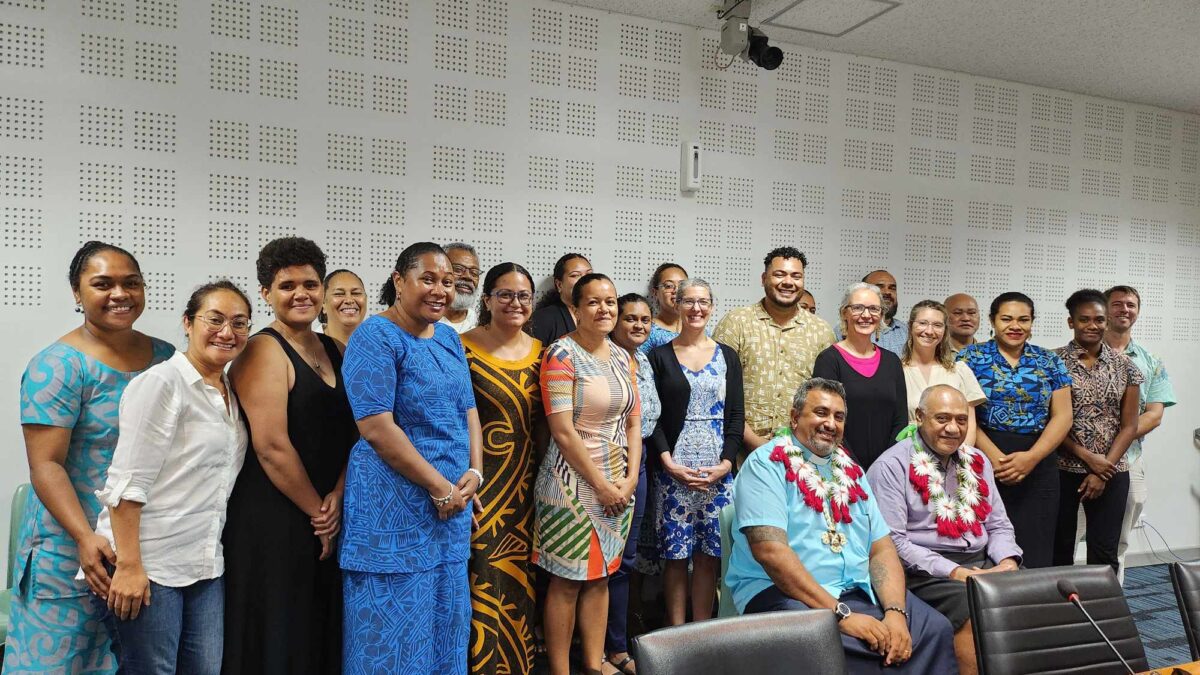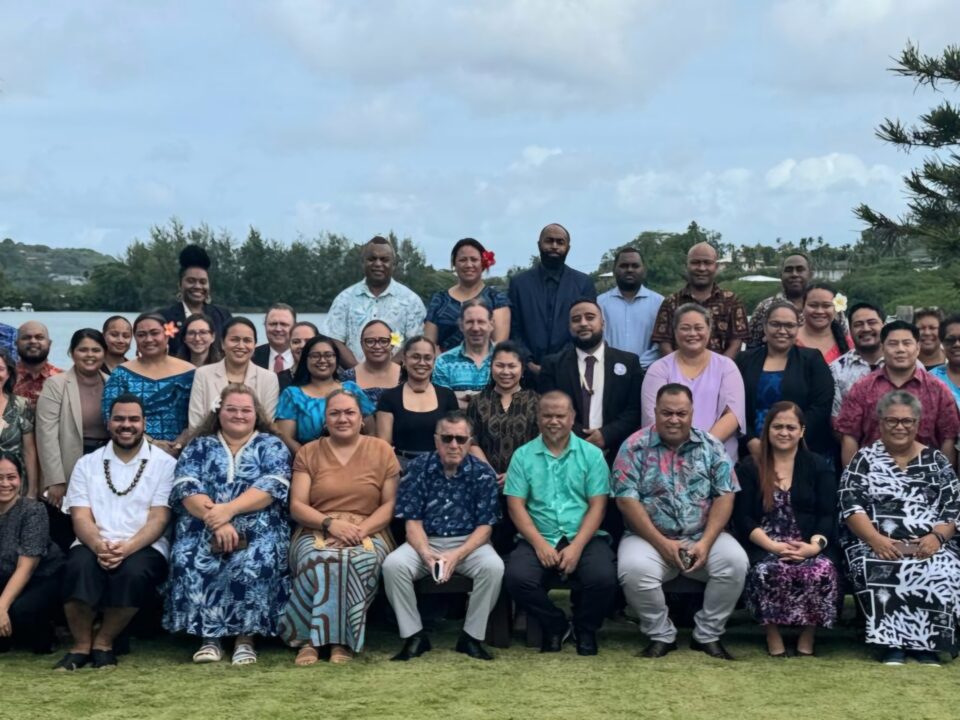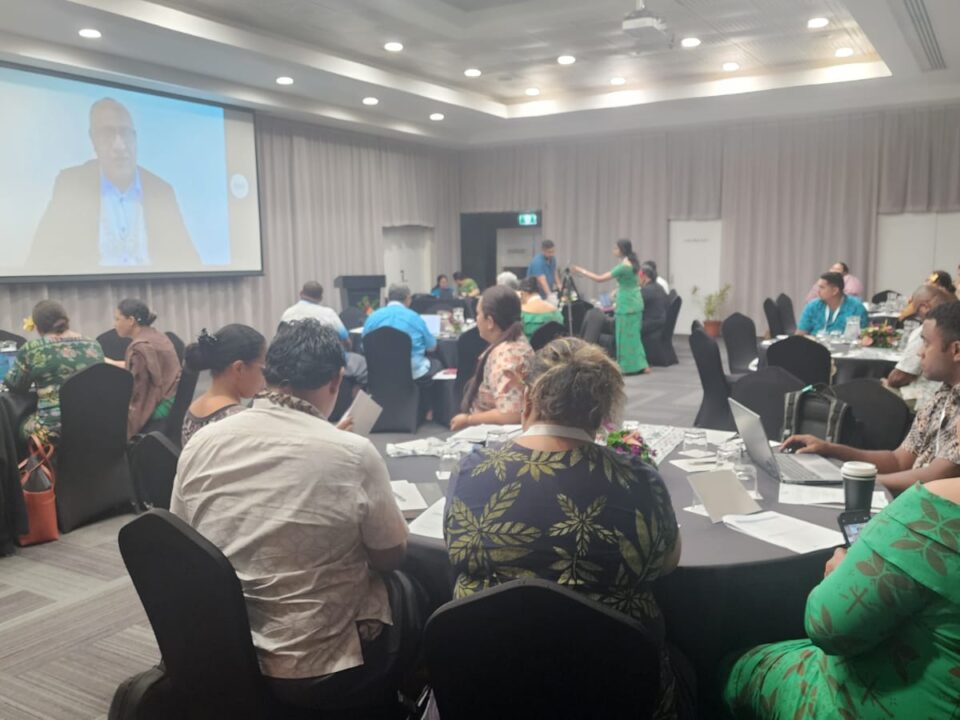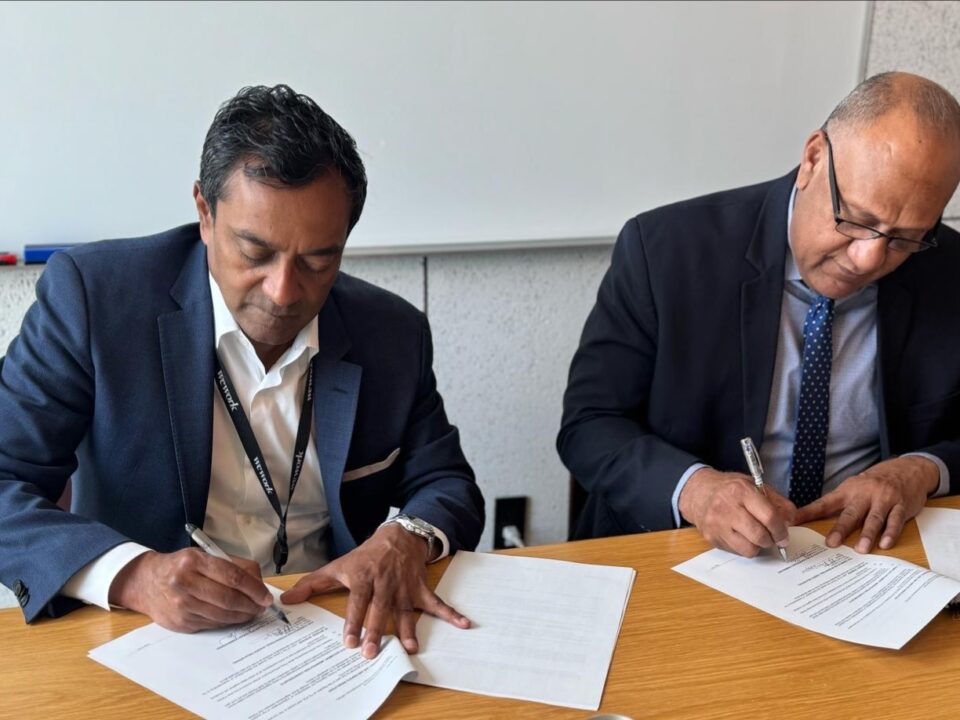
Sitting: Reverend James Bhagwan, Secretary General Pacific Conference of Churches and Dr Filimon Manoni, Pacific Ocean Commissioner
Standing: Participants of the Regional Symposium on Plastics Pollution in the Pacific Islands held in Suva, Fiji.
Regional Symposium on Addressing Plastic Pollution in the Pacific
Opening Statement
September 26, 2023
Pacific Ocean Commissioner- Dr Filimon Manoni
PSIDS Chair
AOSIS Chair
Pacific Conference of Churches General Secretary Reverend James Bhagwan
Ladies and Gentlemen.
Iakwe, bula vinaka and greetings to you all.
Thank you for this opportunity. Last week was a great week for the ocean. I was in New York last week to witness the event on the opening of the BBNJ Treaty (international legally binding instrument under the United Nations Convention on the Law of the Sea on the conservation and sustainable use of marine biological diversity of areas beyond national jurisdiction) for signature. That completes the circle in terms of the governance of the ocean. We normally only speak about the governance within our exclusive economic zone. The High Seas Treaty now that completes the circle. And we hope that our countries in the region will contribute to the prompt entering into force of the treaty.
On the other hand, work is underway on the Plastics Treaty, which we hope that all of us will work very hard together to get an agreement in place. Thank you Rufino* (Varea) for the initiative. It is very encouraging to see young professionals in the region take up the initiative on these global issues that impact us here in the region.
We are here today because we are concerned about plastic pollution. It is indeed one of the most pressing challenges of our time. As Reverend Bhagwan had said, this is an issue that they as a group have been calling for action on. I believe we now have a draft text been released by the Chair. The region under the leadership of SPREP will provide an analysis on where that stands in terms of interests in the Pacific and to see how we tackle those issues.
We also know about the Pacific Garbage Patch. And also know that every year, 400 millions tonnes of plastic is produced and about 40 million tonnes of that end up in the ocean, which is approximately 80% on marine debris.
That plastic break down into micro and nano plastic which is then ingested by marine species which end up in our plates at home. So, clearly, plastic pollution does affect the health of our ocean, our health, our environment, our economy, and our cultures.
But let’s be honest, lifestyle has also contributed to the issue. We need to bring all our stakeholders together. For instance, in fisheries, which is an important industry or sector, to many of our countries, there are lines, nets and many of these plastic products. The health system relies a lot of products, including disposable plastics.
That said, our overreliance on plastic has been at the core of the disposable culture that we have embraced. We have become dependent on this harmful industry that uses harmful chemicals and fossil fuels in its production and create tremendous stresses to our waste management systems.
But I think the picture is not that all gloomy. In the region, the Pacific Regional Declaration on the Prevention of Marine Litter and Plastic Pollution and its Impacts acknowledges the need for more ambitious action, including global and regional policy frameworks such as extended producer responsibility, and calls for discussions on a global agreement to address plastic pollution. The Cleaner Pacific 2025 frames our collective response to waste and pollution. The 2050 Strategy for the Blue Pacific Continent further support these regional endeavors. I think we will hear from the SPREP representatives on what they and Pacific countries do to address the challenges.
We have shown eagerness to work on the issue, but we need to make more efforts.
We need an approach that tackles the whole of lifecycle of plastic. And we need these efforts to include all sectors- We need the involvement of all stakeholders: those in the fishery sector, agriculture, every stakeholder, every sector has to be part of these discussions.
Governments, parliaments, scientists, civil society organisations, private sector actors, youth groups, women groups, indigenous peoples and local communities. And we need a global approach with all countries globally.
This is why the process established by the UN Environmental Assembly last year through resolution 5/14 is so significant and critical. An international legally binding instrument is what the world needs to effectively tackle plastic pollution, including in the marine environment.
A few weeks ago, the draft text of the treaty was released. The text sets the frame for a comprehensive approach that captures the full lifespan of plastic, from production, design, consumption, and disposal. It will be guided by clear objectives and principles. It will provide for legally binding obligations with global measures to be complemented by national plans. For the treaty to be effectively ambitious, it needs adequate means of implementation, including capacity, technology and financing, that take into account the special circumstances of SIDS. It also needs to ensure accountability, as well as effective cooperation. We will hear more on the 0-draft and the INC process later on today so I will not go into in-depth discussions.
The Office of the Pacific Ocean Commissioner is working through SPREP to provide support for our Pacific negotiators in this important process. Next month, they will gather in Palau to further study the draft text. As we have done in previous multilateral processes, we want to ensure that our Pacific representatives receive adequate support, that they understand where the interests of the region are. What the concerns of their constituencies are. That they are given advice to advance these interests.
This is the reason why we need to hear from you and more stakeholders from our region. We need the whole of Pacific to be aware of these negotiations and to contribute to those. We need to make sure that the future treaty is not only ambitious, but it benefits our countries and our people.
The OPOC will continue to work closely with SPREP and the Pacific delegations, in particular the chair of the Pacific Small Island Developing States. We will also continue to reach out to other sectors from the region to ensure that positions taken are coherence and mutually supportive.
Last week, I travelled to New York for the High level week. I heard from various stakeholders, including representatives of the business coalition engaged in the treaty. I see the support for this treaty. I see the support for robust global standards and rules. I see the understanding for the need to fight our collective addiction. But we need to make sure that what is agreed on does not undermine our region’s interests and does not burden our islands. So we need your support to find the solution that works well for us all.
While this important treaty is being negotiated, we can all take steps to move away from the plastics. We can start small at home: Choose to refuse plastic products, when you eat. You can slow down on your use of disposable plastic soda bottles. You can choose to slow down on the use of plastic bags and takeaways disposables, go to the markets with your own reusable bags. And if you can, cook at home. Not very simple, but together we can contribute to solving this issue.
I wish you all a very productive meeting and I look forward to the outcomes of these discussions.
Komol tata.
Rufino Varea, a Phd Candidate at the University of the South Pacific, is the organisor of this regional symposium



